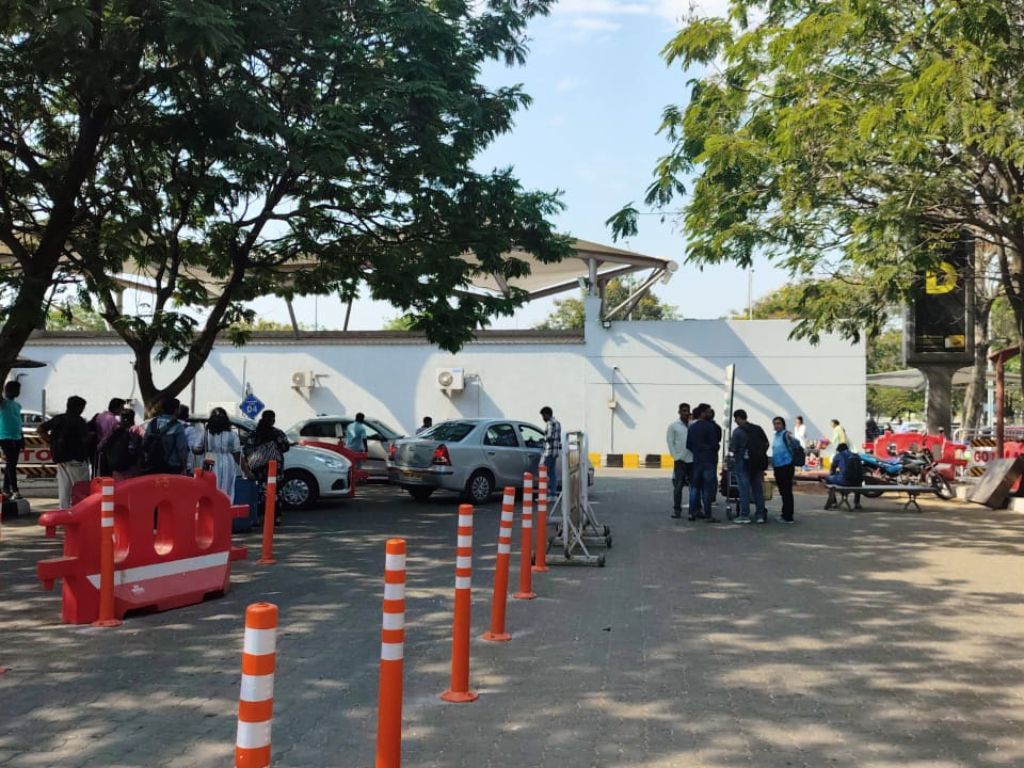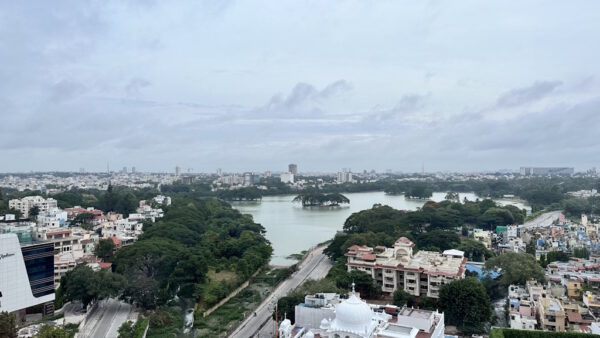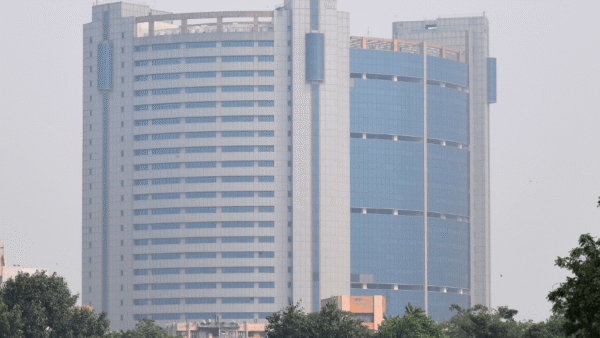This year, Hyderabad recorded temperatures crossing 40 degrees Celsius in mid-March with heat wave conditions intensifying across the state of Telangana. As the weather in Hyderabad fluctuated from thunderstorms to rising heat in March and April, we were happy for the first time in years since we began making airport trips. After long and tedious driving, we, the taxi drivers, finally had a resting room to cool ourselves in the harsh summer heat. This facility opened in September 2024 after numerous appeals, protests, meetings with authorities, and discussions – a four-year-long struggle to secure basic amenities.
In the otherwise luxurious Rajiv Gandhi International Airport, it is a non-descript one room with sitting and sleeping arrangements but getting even this was not easy. Organising ourselves to fight for our rights was the first step. Convincing our fellow taxi drivers to collectivise and build the pressure demanded a lot of our working hours. We were persistent with our demands and knocked on every door, writing regularly to the ministries in the central and state governments, chasing ministers for months, going after GMR officials, and keeping up the momentum – all for a place to sit or rest.
India has many graduates and postgraduates but they do not all get jobs. Many enter the gig sector to earn what little they can. We found out that many among the aggregator taxi drivers are educated, some are graduates and postgraduates, even MBAs. We identified them, formed a team, discussed the problems we all faced and asked them for ideas. Collectively, we then took to social media and started hash-tagging people, GMR, state and central ministers for a resting room at the airport. We also sought support from our customers.
And finally, after four years our demand for a resting room was met. It feels like a huge achievement but it is the bare minimum amenity we should have been provided. Our struggle also showed why platform and gig workers need to organise to get even basic facilities and secure rights.
Left out in airport planning
The Rajiv Gandhi International Airport in Hyderabad opened in 2008. Spread over 5,500 acres and despite being built on agricultural land, there are hardly any trees or greenery around it. As such, there was no natural shaded area around for anyone who had to wait there as part of their work. Ola, Uber and Rapido services started in 2014. The place allotted to us for parking was an open dirty ground, a muddy area with potholes and absolutely no shade.
We would wait there for hours for passengers — in the hot summer months and in pouring rain. Without washrooms, with no access to clean drinking water and food, it was exhausting. The Telangana Gig and Platform Workers Union submitted, to the GMR Group which was operating the airport then, a list of demands from taxi drivers which included adequate parking space for vehicles and a proper resting area for us. When we told GMR officials our plight while waiting for hours without proper facilities, they put some benches beneath a few trees but this was useless especially during rains.
We kept pushing our demands for a proper resting room and other amenities. We then formed the Telangana Gig and Platform Workers Union (TGPWU) in 2019 with a 50-member core team. This team is divided into groups with each group looking at a specific problem. We drivers and gig workers run the union ourselves. The delivery workers take up the problems of their fellow workers since they understand the problems better. The strength of cab drivers in the union now is more than 10,000.
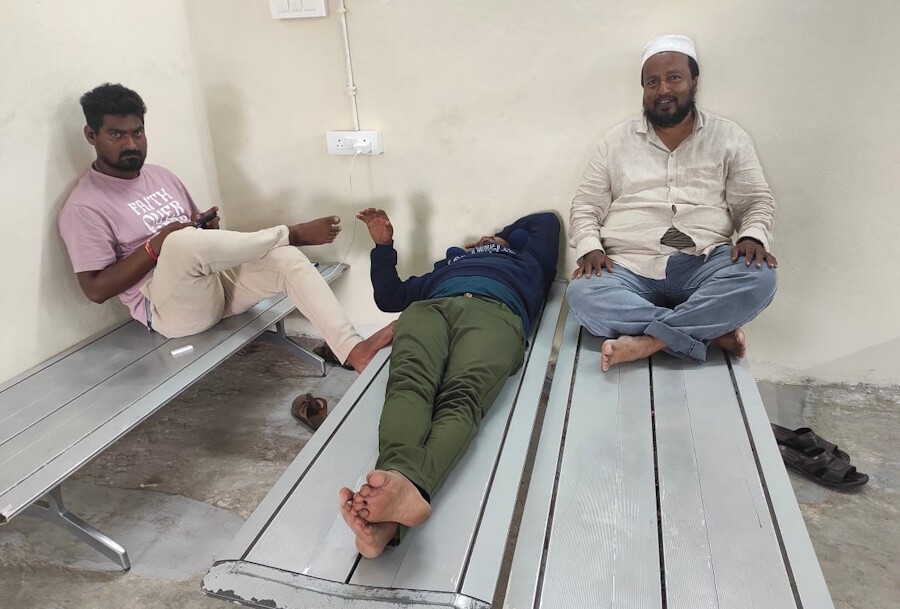
Photo: Telangana Gig and Platform Workers Union
We put forth our demands with more intensity and then started rounds of protests, follow-ups, meeting officials and ministers, and campaigns. We conducted audits among drivers about what they want, and built pressure on the authorities. It took us four years to get a dedicated parking lot and washrooms. Now, the waiting area near the parking lot has some seating arrangements with lights. Initially, from here to the canteen was a long walk of one and a half kilometres but we took this to the management and ensured that there are canteens at both ends of the parking lot, thus, saving drivers the long walk. The subsidised prices in the canteen allow drivers to have a cup of tea for Rs 10.
There was a godown left aside during construction of the parking lot which was converted into the resting room for drivers. Although small, it at least gives us respite from heat and rain. We agitated and approached the airport officials who surveyed and then came up with this solution, but our question is why these amenities were not provided anyway. The union also fought for resting rooms for delivery boys in Hyderabad and we got two last year in Narayanguda and Santosh Nagar.
Platform and gig work is all work, meagre earning
A report by the University of Pennsylvania and the Indian Federation of App-Based Transport Workers (IFAT) found that 83 percent of cab drivers and 78 percent of delivery workers work more than 10 hours a day.[1] This is true for us too.
An aggregator platform cab driver in Hyderabad starts work around 6am and goes on for 12 to 14 hours every day. His monthly income is Rs 35,000 to Rs 45,000 after deducting fuel cost but he has to pay for the yearly permit, vehicle maintenance (around Rs 400 a day), insurance (Rs 20,000 to Rs 25000 a year). Ideally, our monthly earning should be above Rs 50,000 for the number of hours we work.
In 2014, when the aggregators’ platforms ventured into the city, no one knew their role and agenda. When they started lowering prices in 2016, the workers opposed this as it became difficult to make ends meet. In 2017, when we approached the labour minister, the officials checked all the documents and told us “you are partners, not workers, with the company”. All aggregators call us partners but our share is meagre. The government flatly told us: “go and fight with the company and ask them to give you your share”. None of the companies did.
The transport department said the same thing and in the numerous discussions, the word ‘gig worker’ emerged and, after that, the union of gig workers was formed. But then another problem surfaced. Gig workers are those who work part-time. The companies then said: ‘You are gig workers, the others who work with us are platform workers’. We work from 6am till night — more than 8 hours — how can we be called gig workers? The two terms platform and gig workers then merged. The central government also recognised us as gig and platform workers.
When basic compensation is itself an issue and we do not get a fair deal, the other necessary amenities seem out of reach. Neither the platform companies nor the Rajiv Gandhi International Airport authorities allocated proper space for cab drivers and provided the most basic facilities such as resting rooms, washrooms, cooling devices like fans or air-conditioners, canteen and so on. Our cab services were needed at the airport but we were not accommodated in the plan. Is this fair?
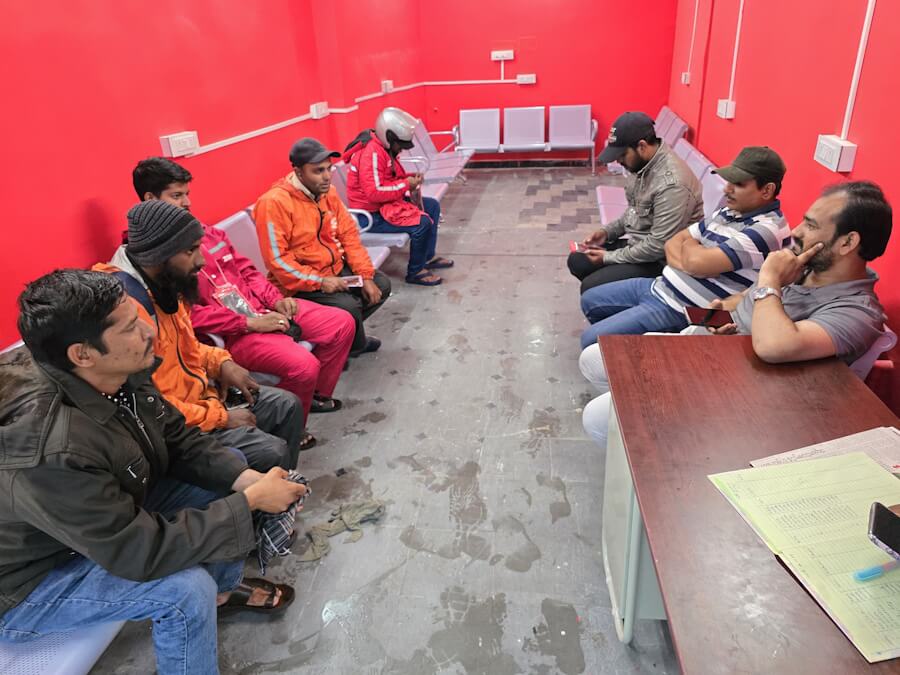
Photo: Telangana Gig and Platform Workers Union
What other airports are doing
The amenities for us came after the Mangaluru International Airport opened a resting room for taxi drivers in February 2023 with seating benches, washrooms, and even spaces to sleep.[2] If one international airport could provide facilities for drivers, why couldn’t others and why has the government or Airports Authority not made this mandatory while planning airports is the main question.
In 2023, Rajasthan became the first state in the country to pass the Platform-based Gig Workers (Registration and Welfare) Act, 2023. But sadly, the government changed and the Act is yet to be implemented. Around 3.5 lakh people are covered under the Act, according to estimates.[3]
Karnataka is the second state to draft a bill to implement the Gig Workers’ Welfare Act and can set up a welfare board for ‘partners’ of companies like Amazon, Flipkart, Ola, Uber and others. A 5 percent cess will be collected from the platform companies and the state government will contribute the remaining required funds to support welfare schemes.[4] This month itself, Chennai opened air-conditioned resting areas for gig workers along major roads. They have well-maintained rooms, charging stations, comfortable seating, and vending machines.
With increasing delivery personnel and cab drivers on the move for most part of the day in so many cities, these spaces are absolutely necessary to give them respite from heat and rain. Other cities too can replicate this and include such spaces in urban planning which is important for India’s 7.7 million gig and platform workers, officially counted by NITI Aayog.
The Telangana Gig and Platform Workers Union has been urging the state government to draft a welfare Act – and we were happy when chief minister A Revanth Reddy ordered the labour department on April 14 to have a new draft legislation for the welfare of gig and platform workers by May 1.
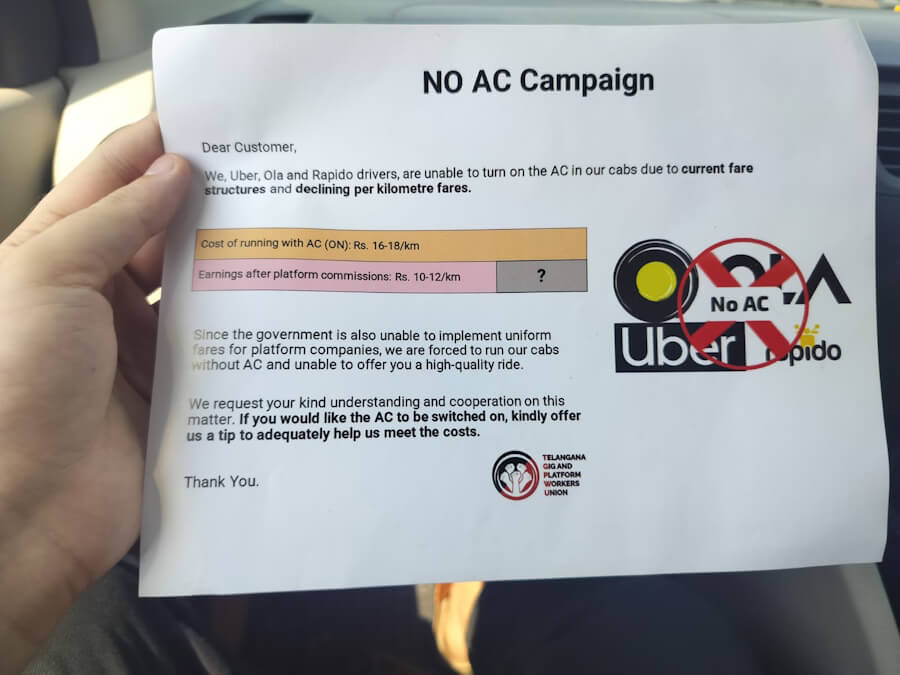
Photo: Manan Bhan
Fight for more amenities continues
Going on a strike is our last weapon. We start with smaller acts. In March, the TGPWU started a ‘Boycott airport campaign’ at the Hyderabad airport in which 62,000 cabs are participating to protest the rates that the aggregators are giving us. A week after we started the campaign, the airport advised passengers to travel from the airport to the city at their own risk.
Simultaneously, we also started the signature campaign for fare hike. The low per-kilometre fare as decided by the aggregators and high operational costs have made our livelihoods unsustainable. We plan to collect at least one lakh signatures and approach the government. In March, we started a ‘No AC’ protest, turning off air conditioning to raise awareness and seek public support for our demands. We are forced to take this step.
It’s only by agitating that we have got what we have, such as the resting area, but other conditions must improve. The resting room is small and accommodates only about 20 drivers. We demand a larger room or more such rooms with some recreation facilities for the mental well-being of drivers. Even now, around 4,000 vehicles are parked under the scorching heat. After we pick up passengers, the car AC is not effective enough or malfunctions. We demand a covered shed in the parking lot to accommodate at least 1,000 taxis. We also urge the authorities to plant more trees which can provide natural shade around our parking areas.
We have done our bit. We have agitated, met authorities, educated our drivers – such as switching off ignition at traffic signals to reduce emissions and save fuel – but, ultimately, this has to be a collaboration between the union, the airport authorities, and the platform companies. They are not working with us, they have not officially acknowledged our efforts. We continue to protest and demand, and expect that the situation will improve. It was important to raise our voices; it is important to keep doing that.
(As told to Shobha Surin)
Shaik Salauddin is National General Secretary, Indian Federation of App-Based Transport Workers (IFAT), and Founder President of Telangana Gig and Platform Workers Union. Mohd Abdul Mazhar Afsar is a member of the union.
Cover Photo: Telangana Gig and Platform Workers Union

